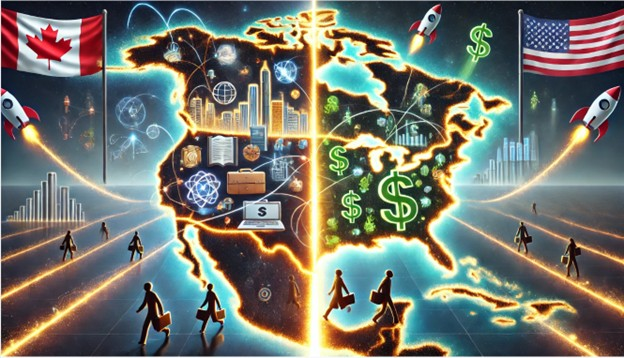Northbound Exit: How Trump-Era Upheavals Are Rewriting the Brain Drain Map
Input
Modified
Disillusionment and Departure: The American Exodus Begins Northbound, Again: Tech Workers Reconsider Canada—and Then Recoil Policy Crossroads: Will Canada Catch or Miss the Wave?

Disillusionment and Departure: The American Exodus Begins
In the shadow of Silicon Valley, a final-year University of Waterloo software engineering student found himself flooded with job offers from both Canadian and American tech companies. Yet the decision was almost automatic. After interning with social media platform X, he signed on with a major U.S. tech firm. “American salaries are easily double or triple Canadian salaries right after graduation, and the gap only gets bigger with seniority,” he said, requesting anonymity out of career concerns.
This isn’t a novel phenomenon. For decades, the brightest Canadian minds have headed south in pursuit of better pay, bigger networks, and faster career progression. A study by startup consultant Charles Plant found that 10% of all Canadian STEM graduates end up working in the U.S., with numbers significantly higher for software engineering grads from schools like Waterloo, McGill, and UBC. Among the 2022 cohort of Waterloo software engineers, 71% reportedly took U.S. job offers.
However, a new twist is reshaping this narrative. As Donald Trump reasserts influence in American politics and begins implementing sweeping changes in scientific and economic policy, a reverse brain drain is slowly forming. This time, it’s not just tech-savvy engineers or entrepreneurial talent departing Canada—it’s American doctors, scientists, and academic researchers looking north for a new start. If Canadian institutions can respond wisely, this could be a historic opportunity.
For Jason Stanley, Yale University’s Jacob Urowsky Professor of Philosophy, the breaking point came when academic freedom itself was threatened. A world-renowned scholar and author of How Fascism Works and Erasing History, Stanley announced in March that he was leaving Yale for the Munk School of Global Affairs and Public Policy in Toronto.
“No noncitizen professor at my institution can speak freely about politics ever again,” he declared. His decision came amid what he called a “fascist regime” taking shape in the United States—one where DEI programs were dismantled, NIH and NSF budgets slashed, and criticism of systemic racism criminalized under vague education laws.
Stanley won’t be alone in Canada. Historians Timothy Snyder and Marci Shore, also from Yale, have joined him as part of an academic “resistance cell” at Munk. Their goal: to train journalists, politicians, and civil society leaders from nations experiencing democratic backsliding. “We will work to solidify Canadian democracy in the face of this onslaught,” Stanley told CBC.
Stanley’s story is emblematic of a broader migration now under way. At CanAm Physician Recruiting Inc., founder John Philpott reports an unprecedented flood of 20 to 30 daily inquiries from U.S. doctors seeking Canadian placements. “It’s huge,” he said, noting open roles for family doctors, OB/GYNs, ER physicians, and specialists across the country.
Fueling this exodus are Trump-era policies targeting science and public health. With over 20,000 jobs cut from U.S. health agencies, hundreds of millions in grants frozen, and entire labs defunded—particularly those focusing on sex, gender, and reproductive health—many researchers are now in freefall.
A poll from Nature found that three-quarters of U.S. scientists are considering leaving the country, with Canada among the top destinations. Dr. Stephen Archer, a former U.S. faculty member and current director at Queen’s University, likened the scale of disillusionment to the Vietnam War draft exodus. “There’s a disturbance in the force,” he said. “Americans are considering moves they wouldn’t have considered before.”
Yet institutional hurdles remain. Canadian universities are facing hiring freezes, tight budgets, and lagging research funding. The Canadian Institutes of Health Research operates with a budget of just $1.2 billion, compared to $45 billion at the NIH in the U.S.
Still, Canada has moved quickly in some areas. Ontario, Nova Scotia, New Brunswick, and Saskatchewan now fully license American-trained doctors without additional exams. 347 U.S. physicians registered with Philpott’s agency in the past year, including 141 in just the last three months. According to the College of Family Physicians of Canada, certifications via fast-track routes have surged 300% since 2018.

Northbound, Again: Tech Workers Reconsider Canada—and Then Recoil
While American scientists and medical professionals look north, Canada’s own tech workers may be heading in the opposite direction.
The U.S. remains a powerful magnet for Canadian STEM talent. Bilal Akhtar, a Waterloo software engineering grad who now works for DataBricks, said most of his peers moved south immediately after graduation. “If Trump makes it easier for skilled workers to work there, I can definitely see more folks going,” he said.
During Trump’s first term, Canada benefited from strict U.S. immigration policies, attracting H-1B visa holders and skilled migrants. But Trump’s second-term tone has shifted. He now supports "legal immigration" to support manufacturing, and has signaled interest in reforming H-1B programs, with Elon Musk pledging to defend them from restrictionists. That’s a game-changer.
Canadians don’t even need an H-1B visa—they can work in the U.S. through TN visas under the USMCA agreement, making them especially attractive to U.S. employers. Immigration lawyer Jonathan Grode confirms that once they secure this visa, they avoid extreme vetting procedures required of other nationalities.
But the reverse pull is more than just immigration logistics. U.S. tech salaries are 46% higher than Canadian salaries, even after adjusting for cost of living and exchange rates, according to a Toronto Metropolitan University report. U.S. firms also offer bigger networks, more funding, and access to cutting-edge projects. For young engineers, it’s often too tempting to pass up.
The cost of trying to retain this talent is rising. Rob Darling, founder of Kitchener-based startup runQL, described Canada as a “declining market” for engineers, citing Ottawa’s proposed capital gains tax hike and a cooling venture capital landscape. Immigration law firms have also reported a dramatic uptick in Canadian business owners seeking to relocate to the U.S.—from a handful of inquiries per month to daily contacts.
Despite all this, there are still reasons to stay. Akhtar praised Canada’s predictable immigration pathways, social benefits, and work-life balance. “We have a lot of good ingredients here,” he said. “We just need to use them well.”

Policy Crossroads: Will Canada Catch or Miss the Wave?
Canada stands at a pivotal intersection. On one hand, it could become a global sanctuary for disillusioned American scholars, scientists, and clinicians—a place where truth is pursued without fear and innovation flourishes with integrity. On the other, it faces the risk of losing its brightest tech minds, drawn south by money, opportunity, and momentum.
Experts argue that timid, piecemeal policies will not suffice. CIGI’s James Hinton warns: “Even if you get 90 percent right and 10 percent wrong, you lose.” In the digital economy, small gaps in immigration, tax, or innovation policy can drain national value at scale.
What can be done?
- Expand research funding to make Canada competitive in biomedical sciences.
- Create special hiring tracks and start-up funding for displaced U.S. academics.
- Double down on fast-track medical licensure pathways to integrate U.S. clinicians into Canadian healthcare.
- Secure larger venture capital rounds so startups can recruit and retain local talent.
- Launch national recruitment campaigns akin to the anti-tariff billboard effort—welcoming U.S. doctors, researchers, and founders with concrete offers.
Dr. Archer supports reviving the Alberta Heritage Foundation model, which once offered million-dollar start-up packages to global scientists. Dr. Raywat Deonandan, an epidemiologist and science communicator, adds: “Offer them everything—money, tax breaks, Raptors tickets. Whatever it takes!”
Some skeptics question the fairness of prioritizing foreign talent when Canadian professionals feel overlooked. But Deonandan offers a sports analogy: “If you try to win the cup, you have to attract the free agents. Then use the success to build your team.”
Jason Stanley’s move to Canada isn’t just symbolic. It represents a growing shift in global brainpower—a migration driven by authoritarian threats, politicized science, and disillusionment with democracy’s decline. Meanwhile, Canada has the opportunity to welcome these minds—but only if it can retain its own.
The choice ahead is clear: compete globally, invest nationally, and act decisively. If Canada succeeds, it could secure not just talent—but leadership in medicine, science, and technology for a generation to come.
The world’s brightest minds are moving. The question is: will they choose Canada to stay—or just pass through?





















